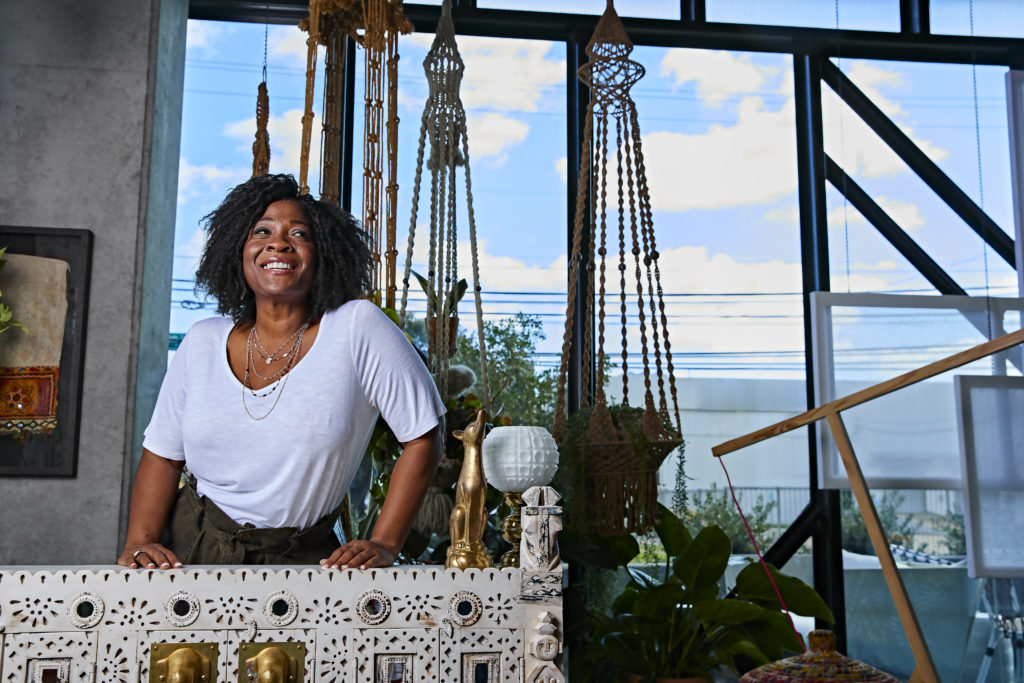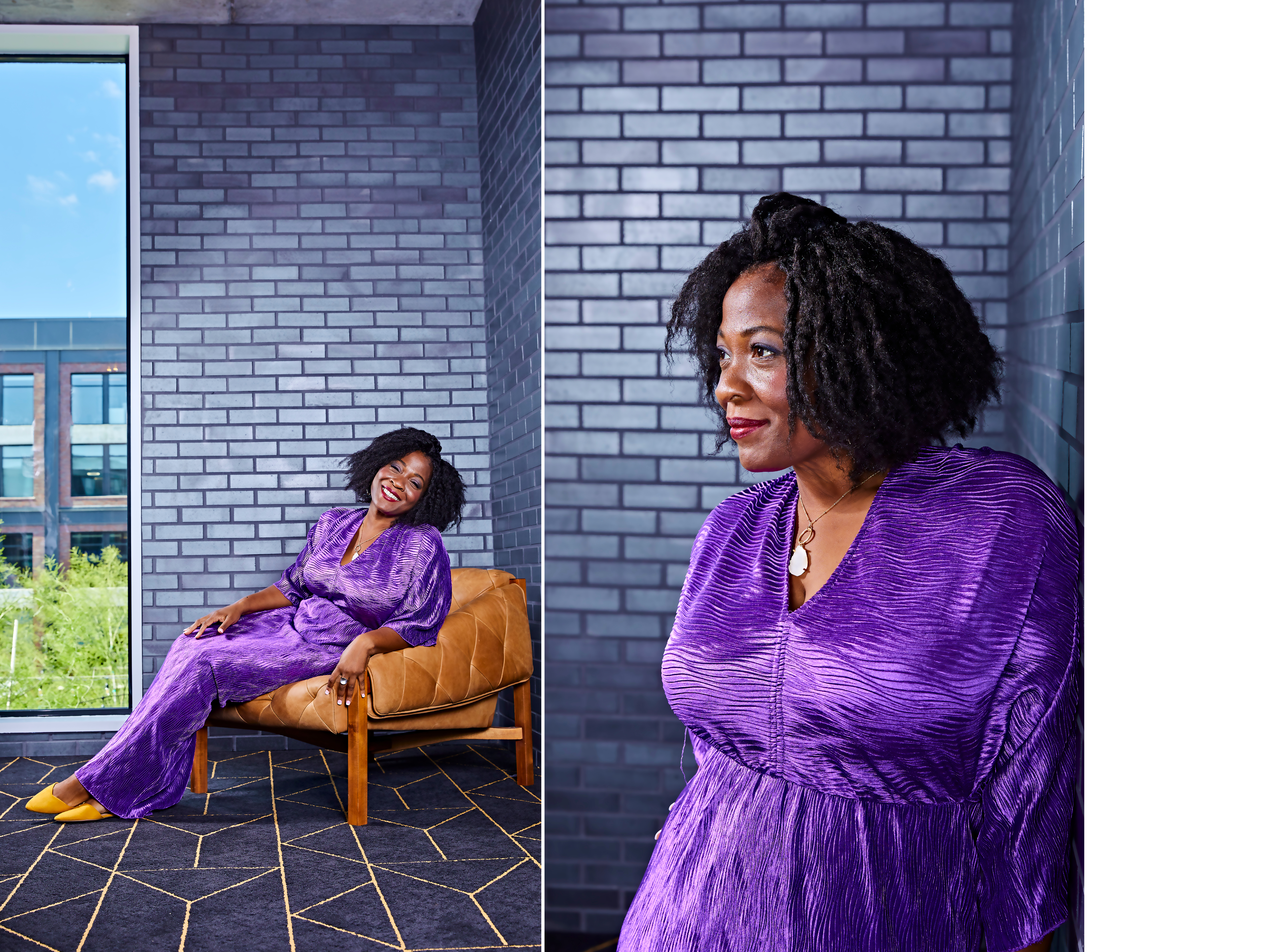Political analyst and social-justice advocate Jehmu Greene is on a relentless mission to empower women and fight for change.
By Hannah J. Phillips, Photos by Annie Ray, Makeup by Gertie Wilson, Styled by Niki Jones, Shot on Location at Arrive Austin
Jehmu Greene has never doubted that a woman’s place is in the house—and the Senate. Born in Washington, the vivid imagery of the White House and national monuments instilled in her a strong desire to participate in politics while she was still in preschool. Moving to Texas at the age of 5, Greene recalls the impact of local female political leaders like Mayor Carole Keeton, Barbara Jordan and Wilhelmina Delco on her childhood.
“It was embedded within my understanding at an early age that women were political leaders,” she says. Greene’s parents emigrated from Liberia on student visas to pursue degrees in political science, but when political unrest unfolded in Liberia, they remained in America once their visas expired. Since her other family members were involved in politics (her grandfather had served as postmaster general and her dad’s cousin was vice president), several of them escaped to America to join her parents.
Growing up as the daughter of undocumented immigrants not only impacted Greene’s political values later in life but also gave her the confidence she traces through her entire childhood and career. Returning to Washington after a brief stint at the University of Texas, she built an impressive resume as the director of women’s outreach at the Democratic National Committee (DNC), president of Rock the Vote and national director of Project Vote. Greene has worked on more than 20 political campaigns—including Hillary Clinton’s 2008 presidential campaign—and served as president of the Women’s Media Center. Her driving force has always been a strong desire to empower the disenfranchised and engage the marginalized, which she currently channels through her work empowering women to run for office at VoteRunLead.
Outlining the milestones that have shaped her political activism, Greene remembers the pivotal moments that made her an evangelist for change. Some of her earliest memories are listening to her parents discuss the 1980 Carter/Reagan election with their friends and fellow academics.
“If you’ve spent a lot of time around first-generation immigrants,” she says, “you know they are very plugged in to the political happenings of the country they have immigrated to.”
Greene’s first childhood home in Austin was in married- student housing in the Colorado Apartments on Lake Austin Blvd while her parents studied at UT.
“On the one hand, you don’t expect luxury in UT student housing,” she laughs, “but it was also lakefront property. We could walk out the door and play at Town Lake, which is the beauty of Austin.”
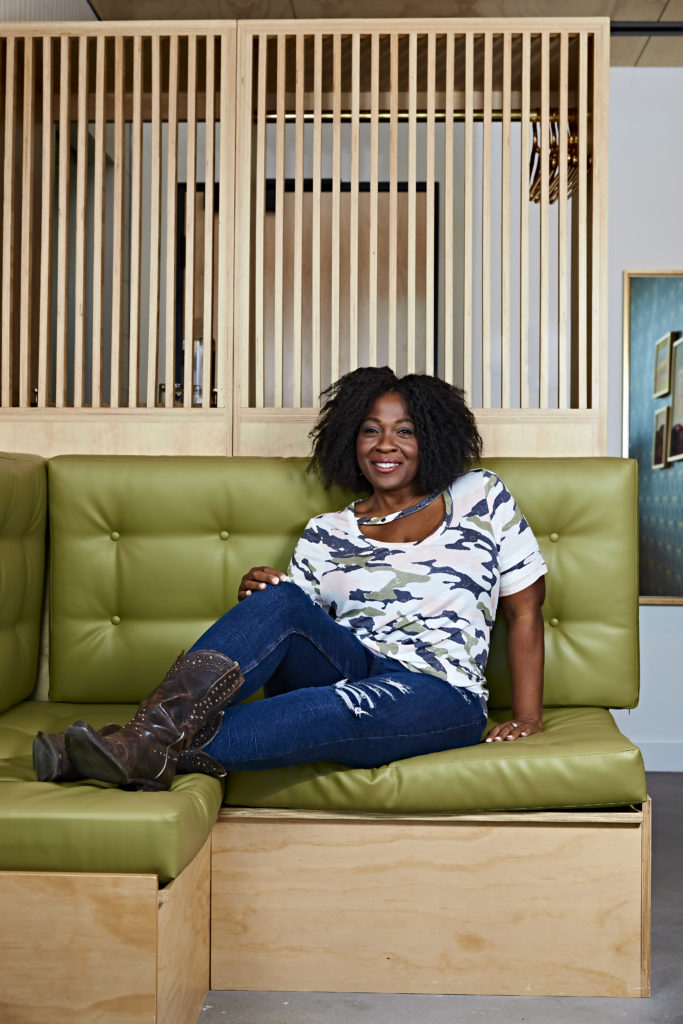
In addition to her early immersion in nature and frequent political discussions at home, Greene recalls being surrounded by a strong international community while growing up in the Tarrytown neighborhood. As the feeder school for the children of international students attending UT, Matthews Elementary provided a diverse student body comprised of cultures all over the world.
“There was something like 100 countries represented at one point,” Greene says, “which has an impact on how you see the world, as well as the spaces you’re comfortable in and know, are possible. I would not be who I am today without that diversity, and all of my work to engage the vulnerable and marginalized came from that space Matthews created.”
Throughout elementary school, Greene participated in the gifted and talented program, which often meant that she was responsible for helping other children learn English. Whether teaching kids from Mexico or Hong Kong, Greene witnessed the tremendous lack of access people have to the world around them when they can’t communicate. Helping fellow students navigate school in a new country sparked her earliest desires to empower underrepresented communities by giving them a voice.
Greene also started exercising her own voice in the classroom, which often got her in trouble as she was the first student to disagree with the teacher and question the process. While Greene’s parents welcomed her outspokenness, they didn’t always welcome the challenges that came with it.
“Arguing about politics is part of Liberian culture,” she says, “but when you’re working three jobs, it’s hard to go in and talk to the principal about your daughter’s behavior.”
After one particular parent/teacher meeting in the first grade, Greene vividly remembers her mother’s surprising reaction.
“The teacher complained that other kids listened to me more than to her, and I thought I would be in a lot of trouble,” Greene laughs. “Instead, my mom just said, ‘There will be a lot of people who won’t like you because of your strong opinions—and you need to get used to it.’”
In high school, Greene’s voice and opinions only grew louder and stronger. At one point, she called out fellow students for ostracizing certain groups from pep-rally preparations when they hosted painting parties in their homes instead of at school. Later, she asked to participate in the Ugly Man contest, which had traditionally only allowed senior males to dress up in costumes.
“I did things like that a lot in high school, but my first real campaign was for prom queen,” she says. “I wanted my friend, John Rey, to be king. He was gay, so I wanted to give him my crown.”
Throughout high school, Greene continued using her voice to support causes close to her heart. She participated in student council and started Students Against Drunk Driving, but the pivotal moment came when she went to cast her first ballot in the 1990 election. Walking proudly up to the poll station on the UT campus, she still remembers the excitement and responsibility she felt about voting for the first time— and then the horror when she learned there was an error with her registration. She begged and cried and pleaded, but she could not receive a provisional ballot.
“That moment still reverberates in my life today,” Greene says. “I felt powerless, and I don’t want anyone to ever feel powerless. There are forces in this country that are purposely designed to make certain communities feel powerless; from that moment on, I decided to do everything I can to make sure communities don’t feel that way.”
While studying at UT, Greene joined the Texas Young Democrats and eventually became the executive director. She also joined the Neighborhood Longhorns Program, which provides mentoring and tutoring to local students more likely to drop out of school. The more she volunteered with these organizations, the more she gravitated toward environments where she could see the direct impact of her work.
“Doing the actual work of providing services to people who need it and helping them find their voice became much more compelling than sitting in the classroom and having theoretical conversations about social change,” she says.
With that in mind—and with $10 in her pocket— Greene left her studies and returned to Washington to chase her childhood dreams. Driven by her desire to engage more young people in the voting process, she sought a job as national youth vote director for the 1996 Clinton campaign.
“I was 23,” she says. “I had no job; I just had the vision. What I ended up doing was actually bigger than what I had envisioned, which became the theme of my early career.”
Despite not landing her dream job, Greene was hired as a program assistant for Center for Policy Alternatives that helped her build her network in Washington. Before long, she became an assistant to Sylvia Panetta, who at the time was on the Joint Committee on Inaugural Ceremonies and whose husband was chief of staff at the White House.
“So many things came from being in that space and taking advantage of those opportunities,” Greene says. “Those early opportunities prepared me early on to be the youngest person, the only woman and the only person of color in those rooms—and to feel confident making sure my voice was heard.”
Those early career experiences continued to sharpen her determination to bring other unheard voices and underrepresented communities to the table. In 2000, she became president of Rock the Vote, a nonprofit whose mission is to engage more young people in the political process. During her tenure as president, she says membership grew from 1,500 to 1 million by 2005 while youth voter turnout grew by 11 percent, a figure she remains proud of today.
“I think as women we should celebrate our accomplishments and I recognize that I had significant success at Rock the Vote,” she says. “The decisions I made helped millions of people vote.”
Her tenure at Rock the Vote opened her eyes to the extreme lack of civic education among young people. The group received countless calls on election day from new voters unaware they needed to register prior to voting, which Greene partially attributes to bipartisan divides at the most basic level in public-school education.
“We are so divided as a country at times,” she says, “that even our education is being framed within these partisan lines. And we’re gonna have to find a way to fix that.”
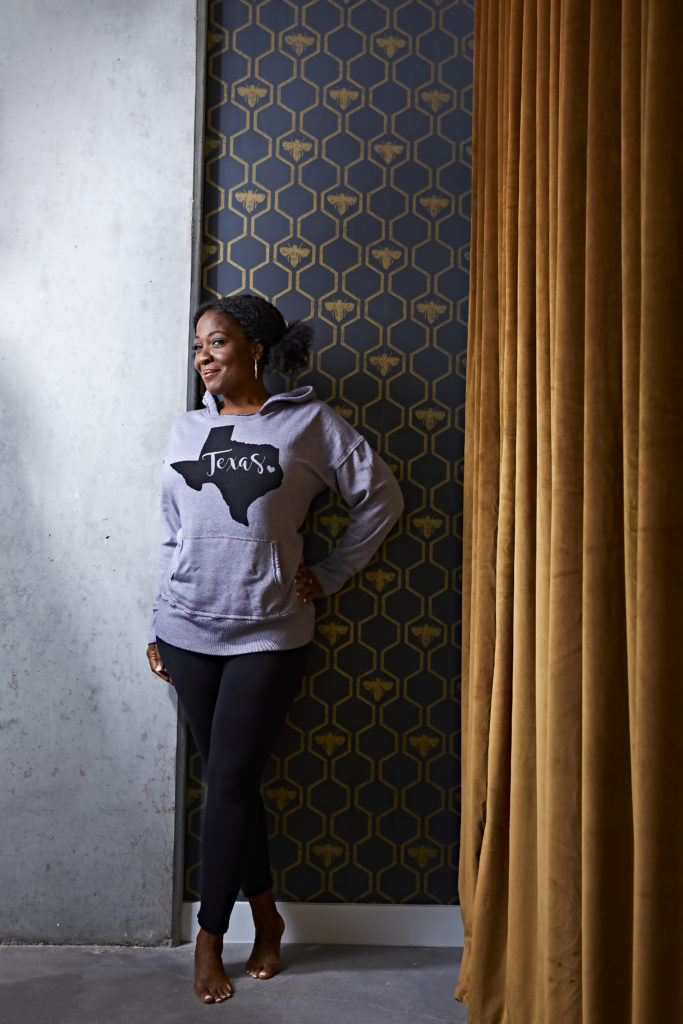
Today, Greene continues to work toward that solution in all of her endeavors, but she is particularly passionate about her work with VoteRunLead. Started in 2014, the nonprofit is now the largest, most diverse candidate-training organization for women in the country.
“We’ve helped more than 35,000 women run for office—and win,” she adds, smiling.
A founding board member, Greene travels the country to lead comprehensive training programs focused on helping women see they already have the skills, experience, talent, vision and passion to lead.
“Because we are so thorough and want to do a perfect job, women often think we need more time in a specific job, more education or more initials at the end of our name before we can consider leadership in a public service position,” she says. “So, a lot of the training I do at VoteRunLead is just helping women understand there’s nothing else they need but this moment.”
Greene encourages her trainees to consume content from a wide spectrum of media outlets, advice she offers to anyone seeking to be an active member of their community regardless of public office.
“Our current media infrastructure has done great harm to embracing critical thinking, so the news we consume can’t come from simply sources that regurgitate our own thoughts,” she says. “You can’t be an expert on any issue unless you know how your opposition frames it.”
As a political analyst for Fox News for the last 10 years, Greene walks the talk, unapologetically defending progressive policies on a largely conservative news outlet. Her views have earned her negative feedback—to put it mildly—from both conservative viewers and her progressive peers, but Greene believes she has a responsibility to share the life experience and perspective from different communities on the network.
“I’m not going to spend an hour and half in hair and makeup to go chat with an audience that agrees with me,” she says. “It’s an incredible opportunity to be able to impact how someone might view a community of people and provide a different perspective.”
Through her work at VoteRunLead, she hopes to encourage more and more women to do the same. In Austin specifically, she has also joined and helped create local initiatives and events, like #tribWomenInspire. With a goal to create more space for diversity and women’s leadership in the city, the program launched during the 2019 Texas Tribune Festival to honor the advocacy of author Piper Kerman. Greene hopes to curate the same kind of environment she remembers from her childhood experience at Matthews Elementary.
“When I first moved back to Austin, it became clear that the spaces familiar to me growing up are much harder to find, so my goal is to help Austin become the community I know it can be,” she says. “My direct personal experience created a version of the city that is possible with a little intentionality; when you invite people into the community with a different opinion and different life experiences, everyone wins.”
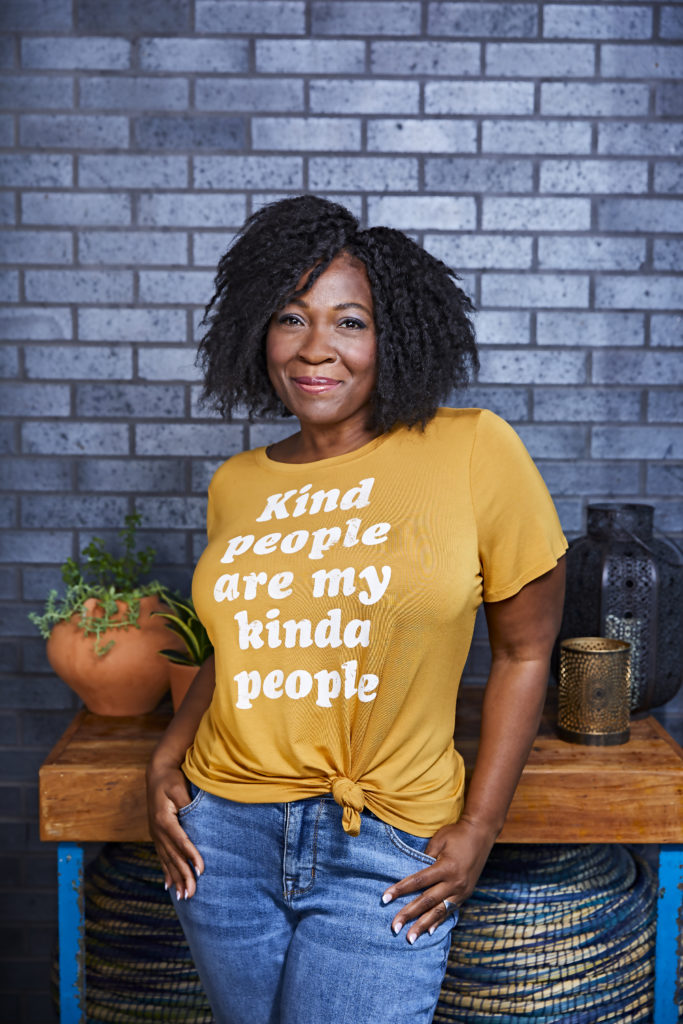
Jehmu Greene’s Tips for Running for Office
- Believe you are qualified. “You have the passion, life experiences and vision to run as you are now. Remember, there’s no ‘right’ person to run, and our government needs a greater diversity of ideas and experiences for our communities to thrive.”
- Politics isn’t a solo mission. “It takes a whole team. Reach out to your network. You’ll be surprised at how your friends and family step up to offer funds, expertise and support. Plus, you’d be surprised at who people know.”
- Be authentic. “Let your personality, passion and purpose shine whether you’re talking to a crowd or a single person. Often, women feel like we have to act or look a certain way as a ‘politician.’ Luckily, many women running today are changing that by rejecting the advice of consultants who try to mold us into a cookie-cutter version of a candidate.”
- Connect on a human level first. “Before you start spouting facts, figures or stats, connect with folks through shared values and in a way that is down-to-earth and honest. I know there’s a lot to get to when you’re making your pitch, but trust me, give it time.”
- Don’t be afraid to get personal. “Make your background part of your campaign. If your life and candidacy intersect in a meaningful way, speak on it! The sticky subjects will become assets if you address them with honesty, empathy and intention.”
- Take VoteRunLead’s 90 Day Challenge. “Accelerate the growth of your political networks, help you find the best office to run for and get connected to a supportive community of women running for office.”
ARRIVE AUSTIN
Arrive Austin is an 83-room hotel on the corner of East Sixth Street and Chicon built to welcome people to the neighborhood. Upon arrival, guests check in at the bar where their welcome drink and snack is on the house. Here, opposites attract as modern industrial finishes meet bright cosmic collages by Sarah Presson. Each room is outfitted with custom Wood Castle millwork, an Apple TV, Marshall speakers and Brooklinen bedding and Turkish towels. Marble-accented bathrooms feature floor-to-ceiling subway tile and come stocked with Niven Morgan’s aromatic bath essentials. When hunger sets in, Vixen’s Wedding serves up Goan- and Portuguese-inspired family-style eats and Lefty’s Brick Bar crafts banh boys and frosty cocktails worth sticking around for. On the second floor deck, Gin Bar pours more than 90 gin varieties from Argentina to New Zealand while Cartel Coffee Lab keeps the third-wave caffeine game strong downstairs. For more information, please visit arrivehotels.com/austin or follow @ArriveHotels, @LeftysBrickBar, @GinBarATX, and @VixensWeddingATX on Instagram.
Ivory druzzy pendant necklace, $16; hoop earrings, $12.95, available at Maurices, 10515 N. Mopac Expy., maurices.com; dress, shoes and ring, model’s own.
Flawless solid tee, $24; olive paper-bag-waist pants, $44; layered necklace, $14.50, available at Maurices, 10515 N. Mopac Expy., maurices.com.
Texas hoodie, $39; high-rise ultra-soft leggings, $15, available at Maurices, 10515 N. Mopac Expy., maurices.com.



